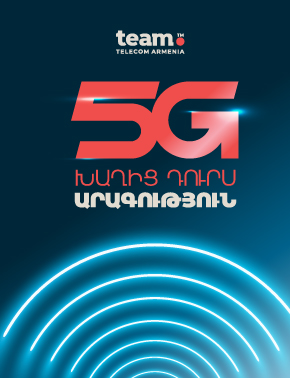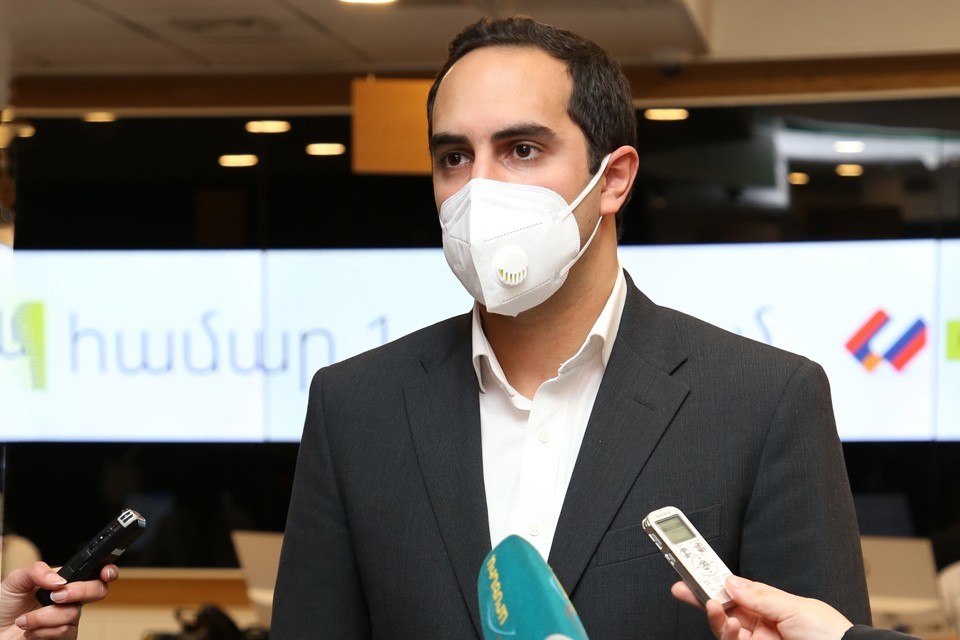-

Gurgen Khachatryan
00:18 | 18.05.21 | News | 11343
Gurgen Khachatryan: Telecom and the future in Armenia
We present to your attention the artcle by Gurgen Khachatryan, Chairman of the board of directors of Ucom.
People look at the phone screen at least 58 times a day. The population of the planet spends 4.5 hours a day holding a phone. In 1973, with the advent of the first mobile phone, the technological revolution was predictable, but no one thought that the phone would not only change the culture of human communication, but also it would speed up the time.
Today, people consume much more content in one day than in a whole lifetime in the Middle Ages. From health, shopping, finances to education and communication; everything is done over the phone, as a result, telecom sector is facing a period of the most difficult and historically greatest opportunities.
1. Challenges of the Armenian Telecom. Everyone will experience the consequences
Today is the World Telecommunication and Information Society Day and I would like to take this opportunity to talk about the future of the telecom sector in Armenia by listing the problems and challenges. Today, our country is facing serious challenges to the infrastructure and information security of the sector. Suffice it to say that the recent changes in the basic infrastructure that nourish the country have sharply increased the risks to national security.
The need to attract new investments for the telecom sector in Armenia, the limitation of market volumes, the provision of regional security, the fragmentation of state sectoral policy lead to the weakening of the sector, and we will all experience the consequences - me, you, our families, our state with its sovereignty. So what to do?
2. How did the telecom begin to develop in Armenia?
The Armenian telecom market has been actively developing since its liberalization and the entry of Vivacell. And in 2009 two new and innovative players entered the market: Orange Armenia in the field of mobile communication and Ucom in the field of internet connection and IP television. The intensive investments of these two operators, which by various estimates exceeded USD 400 million, led to a significant improvement in the quality of services in those markets and a significant reduction in prices by contributing to the widespread dissemination of communication services in Armenia.
It is enough to recall that when we first entered the market with Ucom, the prevalence of the Internet in Armenia did not exceed 5%. Today, as of 2021, there are 3,78 million mobile subscribers (127.4% of the population) and 2,2 million Internet subscribers (68.2% of the population).
3. How did telecom transform. the end of calls and SMS
The mobile market in Armenia began to decline in line with global trends. Over the past five years, the subscriber calls and SMSs constituting the traditional source of income for the telecom sector have given way to call and communication applications that use Internet connection (Whatsapp, Viber, Messanger, Telegram, Signal).
With the spread of social networks, the use of digital content by subscribers has increased. As of 2021, there are 1,8 million active users of social networks in Armenia (60.7% of the population), of which 1,76 million (97.5%) access social networks via mobile phones. As a result, the volume of the use of Internet traffic has increased unprecedentedly, which forces the operators to make new investments for the expansion of the network bandwidth.
4. Salvation model. Why are consolidations so important?
Telecom is a sector that requires intensive capital investments with unacceptably low rates in terms of return on investment (ROI). And in the case of Armenia, high country risk also leads to a high WACC (weight average cost of capital) and, accordingly, to low rates of profitability. In other words, the sector is a trend and dream job for young professionals, but it is a real puzzle in terms of management.
There are various regulatory models in the world today to ensure the stability and business continuity of the sector, two of which are feasible in our region. The first is the sectorally segregated infrastructure operator model which operates under the strict control of the regulator, which leases its network to licensed communication operators on a fair-play basis. The latter “sell” the Internet, mobile services, TV, content, etc. Moreover, the infrastructure operator can be both private and public-private partnership (PPP).
In small competitive markets with a limited subscriber base, the second model of "consolidations" prevails. Finally, if it is not possible to rent a telecom network, at least consolidaqtion can bring business to the market by reducing network capital expenditure (CapEx) and maintenance operating expenditure (OpEx). Consolidations make it possible to exclude the construction of several parallel infrastructures. By drawing parallels, imagine how the investments would diminish if there were several water supply operators in Yerevan, each building and servicing its own water supply network. Consequently, consolidation leads to an increase in investment efficiency, reduction of the investment cycle (buyback terms) and reduction of the cost price of services. As a result of all this, the subscribers are continuously provided with more up-to-date and innovative services at more affordable prices every year.
According to the Capital Confidence Barometer, in 2017 alone, the number of transactions published as a result of telecom consolidations (M&A) exceeded USD 117 billion. There are more than a dozen of consolidations in the territory of the CIS. And now, especially after the pandemic, according to the EY report, 59% of global telecom players consider any form of consolidation (moreover, 45% with another telecom operator and 52% with another sectoral player, including banks and media).
5. Low chances of sector viability at the high level of sincerity
I have recently had an interesting conversation with my daughter who will soon reach the high school age. We talked about the professions of the future and about the fields that will be viable in the future. We ranked the telecom business among the ones that are changing and fighting for viability.
Indeed, telecom players in Armenia should seek out new and innovative sources of income, and there is no second option here. People, who are talking about "5G" and "new generation high speed network" all the time in dreamy terms, are either not honest or do not know the sector, and they forget that telecoms are first and foremost economic entities and non-charity organizations, and if there is no profitability, companies will collapse one after another, which will cause much more damage to the economy.
At Ucom today, we set ourselves the task of increasing operational efficiency, and we are not afraid to say out loud that we must first of all monetize the infrastructure that has already been invested, and then make bold investments in disruptive solutions that change the rules of the game.
Today we are digitally transforming all our functional departments and we are not ashamed to say that there are still directions of work within Ucom where effective solutions are missing. And the last issue and similar issues are resolved with quick and adaptive decision-making solutions. In honor of our executive staff and employees, I must say that we have made a great and sustainable progress.
6. Pandemic as a change management manager
There is such a joke; they say that Covid-19 contributed to the digitization of our company. Indeed, the pandemic was an accelerated course of digital transformation, as a result of which a change of about 5 years was recorded in 1 year. The situation was especially interesting for telecom in terms of change of the content consumption vectors.
In the post-pandemic world, telecom has established itself as a provider of consolidated services that ensures the child’s safety for the parent through the smartwatch. Telecom is your smart home that provides reporting and adjustment for the room temperature over the phone. Telecom is your electronic wallet, your notification and purchasing system, the single electronic management window with government agencies, and finally your education and entertainment.
If you know, Ucom has been offering smart home, smart device sales options for a while now, we have a general education channel with our IP TV, Upay payment system, etc. Before the pandemic, I thought we still had time for strategic development in all directions, as we had a strong position in the market. Now I understand that time ended yesterday, and I often talk to my international colleagues of the field that upgrading the same product or service is no longer enough. Innovation is just like air and water, and to get them, you must have the courage to change the telecom business management method and organizational mechanism.
7. Information security as a priority for Armenia
The main topics in the world today are big data, robotics, artificial intelligence… All these, of course, open a broad window of opportunities for telecom. But today, in post-war Armenia, unfortunately, we are working intensely to ensure the minimum, i.e. the information security.
As an economic entity, we, at Ucom, have a fiduciary responsibility towards our shareholders, our partners and our staff. As an Armenian communication operator, we bear a moral responsibility towards our homeland and state not to allow the information blockade of Armenia under any circumstances. I have already mentioned the risks of information security, the rest does not imply publicity.
I just have to say that, of course, we see solutions to the issue, but that solution inevitably moves from the private field to the interstate regulatory field, and it is necessary for the decision-making authorities to finally put the state interest above the interests of playing "team-team".
8. Ucom as a a strong and adaptive Armenian operator
In conclusion, I would like to urge you to be vigilant and responsible. Those who are already thinking about the future will win. It is important to just remember that telecom is one of the only strategic infrastructures of the country which has an operator with Armenian capital and an Armenian agenda. Ucom is still opening a window of information security and regional influence for the country today, and we have managed to make Armenia an internet transit country. We are currently negotiating to make Armenia a "transit" country of content by bringing the largest international internet companies to Armenia and installing an Internet hub (PoP) in our country.
On the other hand, I believe that the importance of the Armenian operator in terms of the country's information security and digital sovereignty should be identified at the highest level. With this regard, sharing infrastructures and considering consolidation opportunities are an urgent need.
In Armenia, as elsewhere, there is a tremendous amount of work to be done to meet the changing needs of the telecom sector business continuity and of the subscribers. But challenges do not scare us; we have the knowledge and ability to promote our country and protect the interests of our state.

17:29 | 24.09.25 | Articles
Jacopo Losso on Cross-Border Investments and Why Armenia Attracts Angels








